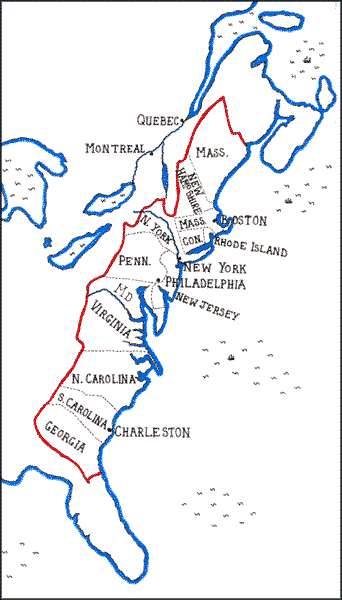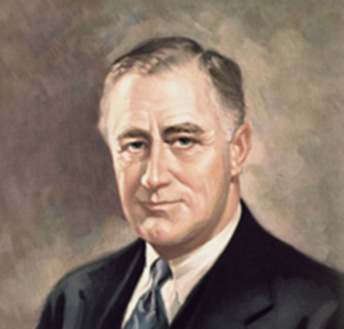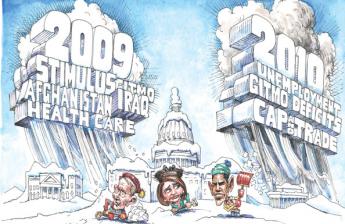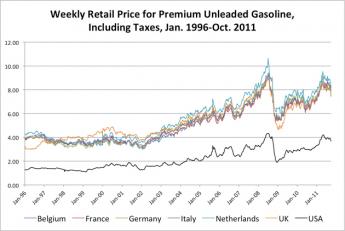Related Topics
Delaware (State of)
 Originally the "lower counties" of Pennsylvania, and thus one of three Quaker colonies founded by William Penn, Delaware has developed its own set of traditions and history.
Originally the "lower counties" of Pennsylvania, and thus one of three Quaker colonies founded by William Penn, Delaware has developed its own set of traditions and history.
...Trying Out the New Constitution
George Washington's first term as President was much like a continuation of the Constitutional Convention, with many of the same participants.
Foreign Affairs
This topic is under construction. Feel free to watch it evolve.
Philadelphia's Fourth Century: Revival or Relapse?
Novelists, sociologists, playwrights, financiers, historians, poets -- and others -- have described and explained the rise and fall of Philadelphia. Each of them is a little bit right, and a little wrong. Philadelphia is hidden, but it isn't hiding.
A Minor Politician
In 2013 I ran for the New Jersey Assembly, unsuccessfully. Daughter Miriam was my campaign Manager. I learned a lot from the experience. For example, I had 700,000 constituents. Maybe I shook hands with a couple hundred.
Constitution and Civil War
The Thirteenth Amendment abolished slavery (and involuntary servitude, except as punishment for a crime). It was passed by the Senate on April 8, 1864, and by the House on January 31, 1865.
Aftermath: Who Won, the States or the Federal?

|
| Thirteen Sovereign States |
In the case of the American Constitution, the initial problem was to induce thirteen sovereign states to surrender their hard-won independence to a voluntary union, without excessive discord. Once the summary document was ratified by the states, designing a host of transition steps became the foremost next problem. The dominant need at that moment was to prevent a victory massacre. The new Union must not humble once-sovereign states into becoming mere minorities, as Montesquieu had predicted was the fate of Republics which grew too large. Nor must the states regret and then revoke their union as Madison feared after he had been forced to agree to so many compromises. As history unfolded, America soon endured several decades of romantic near-anarchy, followed by a Civil War, two World Wars, many economic and monetary upheavals, and eventually the unknown perils of globalization. When we finally looked around, we found our Constitution had survived two centuries, while everyone else's Republic lasted less than a decade. Some of its many flaws were anticipated by wise debate, others were only corrected when they started to cause trouble. Still, many tolerable flaws were never corrected.
 Great innovations command attention to their theory, but final judgments rest on the outcome. 
|
| . |
Benjamin Franklin advised we leave some of the details to later generations, but one might think there are permissible limits to vagueness. The Constitution says very little about the Presidency and the Judicial Branch, nothing at all about the Federal Reserve, or the bureaucracy which has since grown to astounding size in all three branches. Political parties, gerrymandering, and immigration. Of course, the Constitution also says nothing about health care or computers or the environment; perhaps it shouldn't. Or perhaps an unmentioned difficult topic is better than a misguided one. Gouverneur Morris, who actually edited the language of the Constitution, denounced it utterly during the War of 1812 and probably was already feeling uncomfortable when he refused to participate in The Federalist Papers . Madison's two best friends, John Randolph, and George Mason, attended the Convention but refused to sign its conclusions, as Patrick Henry and Thomas Jefferson almost certainly would also have done. On the other hand, Alexander Hamilton and Robert Morris came to the Convention preferring a King to a President, but in time became enthusiasts for a republic. Just where John Dickinson stood, is very hard to say. Those who wrote the Constitution often showed less veneration for its theory, than subsequent generations have expressed for its results. Understanding very little of why the Constitution works, modern Americans are content that it does so, and are fiercely reluctant about changes. The European Union is now similarly inflexible about the Peace of Westphalia (1648), suggesting that innovative Constitutions may merely amount to courageous anticipations of radically changed circumstances.

|
| President Franklin Roosevelt |
One cornerstone of the Constitution illustrates the main point. After agreeing on the separation of powers, the Convention further agreed that each separated branch must be able to defend itself. In the case of the states, their power must be carefully reduced, then someone must recognize when to stop. If the states did it themselves, it would be ideal. Therefore, after removing a few powers for exclusive use by the national government, the distinctive features of neighboring states were left to competition between them. More distant states, acting in Congress but motivated to avoid decisions which might end up cramping their own style, could set the limits. The delicate balance of separated powers was severely upset in 1937 by President Franklin Roosevelt, whose Court-packing proposal was a power play to transfer control of commerce from the states to the Executive Branch. In spite of his winning a landslide electoral victory a few months earlier, Roosevelt was humiliated and severely rebuked by the overwhelming refusal of Congress to support him in this judicial matter. The proposal to permit him to add more U.S. Supreme Court justices, one by one until he achieved a majority, was never heard again.

|
| Taxes Disproportionately |
Although some of the same issues were raised by the Obama Presidency seventy years later, other more serious issues about the regulation of interstate commerce have been slowly growing for over a century. Enforcement of rough uniformity between the states rests on the ability of citizens to move their state of residence. If a state raises its taxes disproportionately or changes its regulation to the dissatisfaction of its residents, the affected residents head toward a more benign state. However, this threat was established in a day when it required a citizen to feel so aggrieved, he might angrily sell his farm and move his family in wagons to a distant region. People who felt as strongly as that was usually motivated by feelings of religious persecution since otherwise waiting a year or two for a new election might provide a more practical remedy. However, spanning the nation by railroads in the 19th Century was followed by trucks and autos in the 20th, and then the jet airplane. While moving residence to a different state is still not a trivial decision, it is now far more easily accomplished than in the day of James Madison. A large proportion of the American population can change states in less than an hour if they must, in spite of a myriad of entanglements like driver's licenses, school enrollments, and employment contracts. The upshot of this reduction in the transportation penalty is to diminish the power of states to tax and regulate as they please. States rights are weaker since the states have less popular mandate to resist federal control. It only remains for some state grievance to become great enough to test the present power balance; we will then be able to see how far we have come.

|
| High Gasoline Taxes of Europe |
Since it was primarily the automobile which challenged states rights and states powers, it is natural to suppose some state politicians have already pondered what to do about the auto. The extraordinarily high gasoline taxes of Europe have been explained away for a century as an effort to reduce state expenditures for highways. But they might easily be motivated by a wish to retard invading armies or to restrain import imbalances without rude diplomatic conversations. But they also might, might possibly, respond to legislative hostility to the automobile, with its unwelcome threat to hanging on to local populations, banking reserves, and political power.
It helps to remember the British colonies of North America were once a maritime coastal settlement. The thirteen original states had only recently been coastal provinces, well aware of obstructions to trade which nations impose on each other. Consequently, they could readily design effective restraints to mercantilism within the new Union. Two centuries later, repeated interstate quarrels provided fresh viewpoints on old international problems. As globalization currently becomes the central revolution in trade affairs of a changing world, America is no beginner in managing the intrigues of international commerce. Or to conciliating nation states, formerly well served by nation-state principles of the Treaty of Westphalia, but this makes them all the more reluctant to give some of them up.
Originally published: Tuesday, May 22, 2012; most-recently modified: Saturday, July 20, 2019